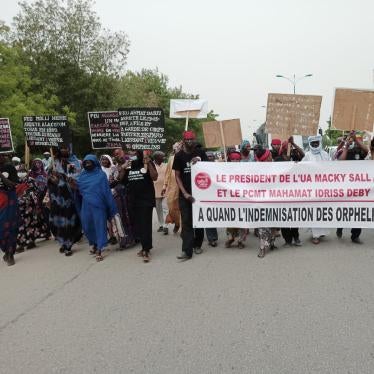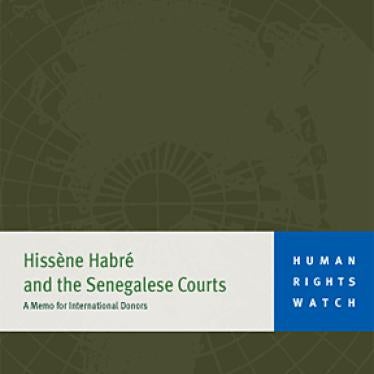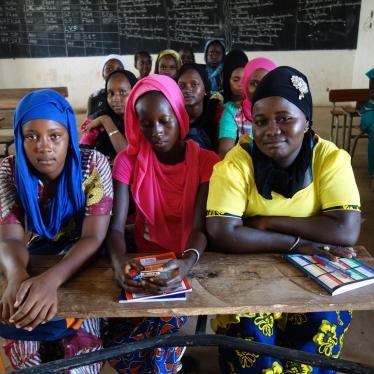(Sirte, Libya) – Three years after asking Senegal to prosecute the former dictator of Chad, Hissène Habré, the African Union should ensure that the trial finally begins to move forward, eight African and international human rights groups said today. African heads of state will come together in Sirte, Libya on July 1, 2009, for an AU summit.
At a summit meeting on July 2, 2006, the AU mandated Senegal, “to prosecute and ensure that Hissène Habré is tried, on behalf of Africa,” and called on the AU Commission, “to provide Senegal with the necessary assistance for the effective conduct of the trial.” Habré is living in exile in Senegal.
“The African Union gave us hope three years ago that Habré would finally be brought to justice, but in these three years I have seen many more of my fellow survivors die while we are no closer to Habré’s trial,” said Clément Abaifouta, president of the Chadian victims’ association. “Unless Senegal and the AU act soon, there won’t be any victims left at the trial.” As a prisoner under Habré, Abaifouta was forced to dig graves for more than 500 fellow inmates.
Senegal has taken no action and the AU has given it no concrete support, said a joint statement by the Chadian Association for the Promotion and Defense of Human Rights (ATPDH), the Chadian Association of Victims of Political Repression and Crime (AVCRP), the Chadian League for Human Rights, the African Assembly for the Defense of Human Rights (RADDHO-Senegal), the National Organization for Human Rights (ONDH-Senegal), Human Rights Watch (HRW), the International Federation of Human Rights (FIDH), and Agir Ensemble pour les Droits de l’Homme.
“The AU’s credibility is on the line,” said Assane Dioma Ndiaye of the Senegalese National Organization for Human Rights. “Both Senegal and the AU have just stalled and stalled in a case in which they could be showing how Africa is capable of fighting against impunity.”
Habré ruled Chad from 1982 until he was deposed in 1990 by President Idriss Déby Itno and fled to Senegal. His one-party regime was marked by widespread atrocities, including campaigns of violence against ethnic groups. Files of Habré’s political police, the DDS (Direction de la Documentation et de la Sécurité), reveal the names of 1,208 persons who were killed or died in detention. A total of 12,321 victims of human rights violations were mentioned in the files.
On September 16, 2008, 14 victims filed new complaints with a Senegalese prosecutor, accusing Habré of crimes against humanity and torture. The authorities have said they will take no action on the complaints, however, until they receive full international funding for all the costs of the trial, which Senegal puts at €27.4 million.
The European Union, Belgium, France, the Netherlands, and Switzerland have agreed to help finance the trial, but are waiting for Senegal to present a credible budget. Chad has offered €3 million as well. The African Union, however, has offered no financial assistance. At its most-recent summit in Addis Ababa in January 2009, the AU called on states to contribute money to the AU Commission for the trial, but none appear to have done so.
“The African Union and Senegal have become accomplices in Hissène Habré’s efforts to escape punishment,” said Jacqueline Moudeina, the victims’ Chadian lawyer and president of the ATPDH. “The question of money for the trial is just a smokescreen. The money is there. What is lacking is the political will.”
Faced with Senegal’s inaction, as well as threats by its President Abdoulaye Wade to expel Habré from Senegal, Belgium on February 19 requested the International Court of Justice (ICJ) to order Senegal to prosecute or extradite Habré and to hold Habré in Senegal until its case was decided. On May 28, the court accepted Senegal’s formal pledge not to allow Habré to leave Senegal pending its final judgment.
“The African Union gets upset when Africans face international criminal justice, but the real problem is that justice in Africa is totally powerless in the face of the crimes committed by African leaders,” said Alioune Tine, president of the Dakar-based RADDHO. “The Habré trial should be a precedent to show that African courts can deliver independent, fair, and effective justice for crimes committed in Africa.”
Background
Habré was first indicted in Senegal in 2000 before courts ruled that he could not be tried there. His victims then turned to Belgium and, after a four-year investigation, a Belgian judge in September 2005 charged Habré with crimes against humanity, war crimes, and torture.
Following a Belgian extradition request, Senegalese authorities arrested Habré in November 2005. The Senegalese government then asked the African Union to propose how to try Habré. On July 2, 2006, the African Union, following the recommendation of a Committee of Eminent African Jurists, called on Senegal to prosecute Habré “in the name of Africa,” and President Abdoulaye Wade declared that Dakar would do so.







